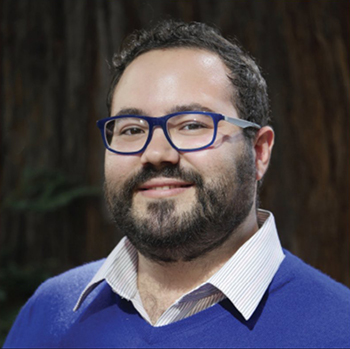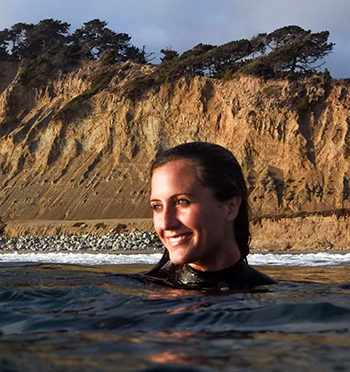A recent alumnus of the Science Communication Program and a newly graduated Ph.D. who is now developing a course for the program are among 24 winners of the inaugural Eric and Wendy Schmidt Awards for Excellence in Science Communications.
Rodrigo Pérez Ortega, from the SciCom class of 2019, was recognized as a winner in the "Science Journalist: Early Career" category for his work as a staff reporter at Science. Peréz Ortega, who reports on diversity in science from Mexico City, received a $20,000 award.
Jessica Kendall-Bar, who received her Ph.D. in ecology and evolutionary biology from UCSC in 2022, was the top prize winner in the "Research Scientist: Graduate Student" category for a range of scientific visualizations. Kendall-Bar, now a Scripps Postdoctoral Scholar at UC San Diego, received a $40,000 prize.
Pérez Ortega was honored for a series of stories in Science, a leading journal published by the American Association for the Advancement of Science in Washington, D.C. His citation reads: "Pérez Ortega's work carefully shows how diversity, or lack of, is undeniably woven into the very nature of science and its ability to help people, especially those in dire need."
His prize-winning articles:
This Ancient Shark Fossil is Exquisite. But Some Researchers Wonder if They'll be Able to Study It
‘It’s Like a Second Extinction’: Retraction Deepens Legal and Ethical Battle Over Rare Dinosaur
Human Geneticists Curb Use of the Term ‘Race’ in Their Papers
Studies of Human Microbiome Have Ignored the Developing World, Potentially Compromising Treatments
‘Staggering’ Study Reveals Nearly Half of Unemployed U.S. Men Have Criminal Convictions
“This award recognizes my work as the first-ever diversity reporter at Science magazine, and it’s a big step to make science a more inclusive endeavor,” Pérez Ortega said.
Pérez Ortega studied biomedical sciences with a focus on neuroscience at the National Autonomous University of Mexico, then worked as a freelance journalist in Mexico City before coming to Santa Cruz. He earned a master’s degree in the SciCom program in 2019, followed by internships at Inside Science News Service and Quanta magazine. He now covers life sciences, medicine, health, policy, and academia; his work has appeared in The New York Times, Nature, Science News, Knowable, and other media outlets.
Pérez Ortega is a founding member of the Mexican Network of Science Journalists and serves on the board of the National Association of Science Writers. He is also editorial director of The Open Notebook en Español.
Kendall-Bar was honored for her work at UCSC on data visualization tools and animations to help scientists communicate their findings. Her citation reads: "Kendall-Bar’s range of beautiful, relatable work utilizes impressive, innovative tools and platforms that can be used to further the cause of science communication into the future."
Her prize-winning projects include work with several different research labs using data visualization tools to transform animal tracking data into cinematic and informative animations of marine mammal behavior (see “Visualizing Life in the Deep”). In her thesis research on the sleep patterns of seals, she worked with Daniel Costa and Terrie Williams, both professors of ecology and evolutionary biology.
She was also recognized for her work with the UCSC Coastal Resilience Lab to develop graphics supporting research on the coastal protection benefits of coral reefs, as well as a data visualization portal for exploring the coastal protection benefits of mangroves.
In addition to her own research, Kendall-Bar helped teach workshops and courses on data visualization at UCSC, and she created an online learning center as a resource for scientists interested in using graphic design, animation, and other visual communication tools. She is now creating a new data visualization course through the SciCom program, as part of a grant from the Burroughs Wellcome Fund, that will be open to all UCSC students.


